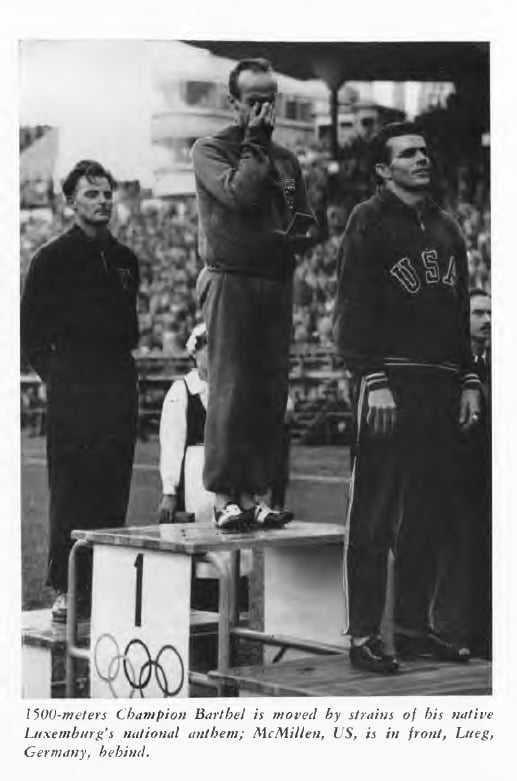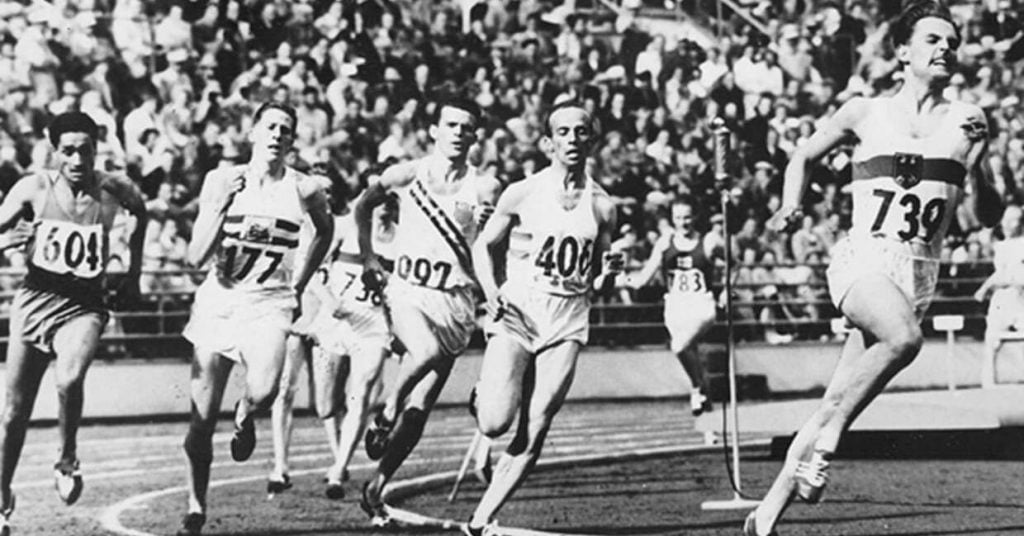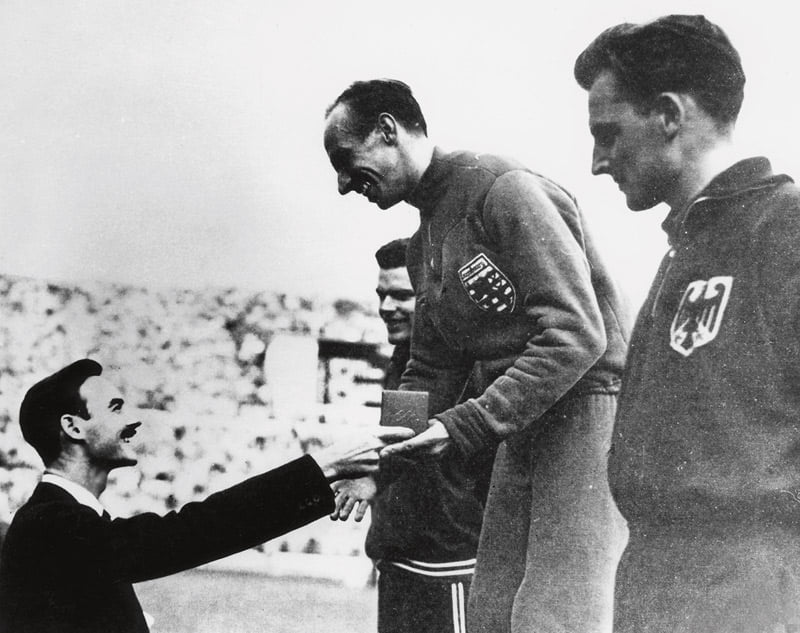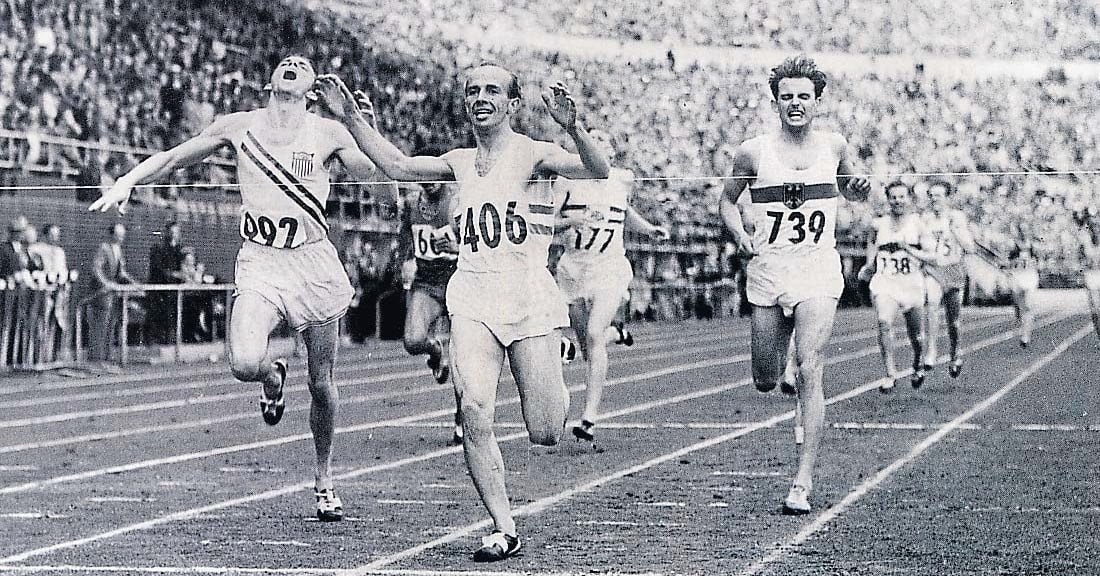Publications about the “unexpected” victory of track and field athlete Josie Barthel are popular on social networks - the organizers were allegedly so stunned that the orchestra could not play the anthem of the winning country and improvised it. We have verified the accuracy of this story.
Details of the events that took place in the summer of 1952 at the Olympic Stadium in Helsinki vary from source to source. For example, "Teacher's newspaper" reports: “At the 1952 games, athlete from Luxembourg Josie Barthel was the best in the 1500 m race. His victory was so unexpected that the organizers of the competition did not even bother to record the anthem of the dwarf state. A group of local musicians came to the rescue and tried to improvise the melody of the anthem. The attempt was so unsuccessful that the champion standing on the podium clasped his head in his hands and began to cry.”
A slightly different interpretation was circulated on VKontakte: “In 1952 in Helsinki, Josie Barthel took first place in the 1500 m race, setting an Olympic record. The success of the athlete came as a complete surprise to the organizers. When the time came to honor the winners, it turned out that there was no recording of the Luxembourg anthem, and the orchestra improvised. Barthel burst into tears on the podium, but not from the joy of victory, but from resentment for his small country.” Similar publications with a photograph of Bartel crying on a pedestal were distributed by many large public pages: "5 interesting facts", "The History of Humanity", Moments of History, World of History, HistoryPorn, "Vintage" and others. Users also spoke about the Helsinki embarrassment in one form or another Facebook, Pikabu, LiveJournal and other social networking and blogging platforms.
Joseph (Josie) Barthel is an iconic figure for Luxembourg. In 1952 he set an Olympic record ran 1500 m distance at the Olympics in Helsinki. Before him, only one representative of a small duchy managed to win Olympic gold - this did in 1900, marathon runner Michel Tétot, and for a long time the International Olympic Committee (IOC) credited this medal to the French team. Be that as it may, after Barthel, not a single Luxembourg athlete managed to climb to the highest step of the Olympic podium. From 1973 to 1977, former track and field athlete headed National Olympic Committee of Luxembourg, now its name wear the main stadium of the country and a special fund, engaged in support for young athletes.
We managed to find two fairly authoritative sources that described a story similar to a popular story on the Internet. In 2017, New York Times journalist Maggie Astor presented on the pages of the publication is a selection of embarrassments and conflicts associated with the performance of anthems at various sporting competitions. The reason for the appearance of such material was confrontation President Trump and his administration with American athletes who began to kneel during the national anthem. Athletes this way expressed his disagreement with the actions of the police against black Americans. Astor tried to present a variety of stories on this topic in the selection, “from offensive to funny to simply absurd.” The journalist was the first to name the episode allegedly involving Bartel: “Few things have a greater impact on the people’s consciousness than the triumph of an underdog. But imagine how frustrating it is when Olympic organizers don't even have your national anthem available. That's what happened to Luxembourg's Josy Barthel when he won the men's 1500m at the 1952 Summer Olympics in Helsinki, beating Bob McMillen of the USA and Werner Lueg of Germany. Barthel cried on the podium when the Olympic orchestra, lacking the necessary notes, improvised his country's anthem."
In 2018 on the official YouTube channel of the IOC came out video “Barthel's Sensational Gold”, dedicated to the success of the Luxembourg athlete in Helsinki. The voiceover accompanying the historical footage reads: “Barthel won Luxembourg’s first gold medal with a new Olympic record. And you know what that means: for the first time in the history of the Olympic Games, the whole world had to hear... the wrong national anthem. Game organizers were unable to find "Hemecht", the national anthem of Luxembourg. They had difficulty finding the correct national flag. This anthem was never played at the Olympics.”
Both publications were critically received in the Luxembourg press. The country's largest newspaper Luxemburger Wort named the story told in The New York Times article is an “anecdote” that, according to them, is not true. The video from the IOC suffered even more: at the beginning of the video, its authors showed historical footage of the duchy, one of which showed the Luxembourg Gardens in Paris - Luxemburger Wort did not miss the opportunity criticize video creators for such a mistake. “Of course, the anecdote also could not be forgotten,” the author of the note concluded, commenting on the story about the episode with Bartel in Helsinki.
Other Luxembourg media, which have repeatedly written about Barthel, do not directly call the anthem story an “anecdote”, but completely ignore it. Examples can be found in publications Tageblatt in 2012, Revue in 2018 and RTL in 2020. It is surprising that the Luxembourgers themselves do not pay any attention to the episode that supposedly overshadowed the moment of the main triumph in the history of Luxembourg sports. There is no mention of it on the IOC website either. publications, dedicated to Bartel’s victory in the Olympic race.
It is significant that until the beginning of the 21st century, the embarrassment with the Luxembourg anthem was practically not mentioned in the press and popular science literature. For example, one can refer to news reports published in July 1952 immediately after Barthel's victory. These texts describe in detail the forecasts before the competition and the progress of the race, but do not say anything about problems with the playing of the national anthem. Examples can be found in archival publications The New York Times, The Washington Post, Evening Star and other newspapers.
However, it would be naive to rely only on news reports - the vast majority of journalists probably did not know what the Luxembourg anthem actually sounds like, and could easily have missed anything strange. However, it is suspicious why this story did not become known even a year later, when the US National Olympic Committee published traditional release of his “Olympic Book” dedicated to the Games in Helsinki in 1952. It features a photograph of Bartel and his rivals on a podium, often accompanied by an “anecdote” about embarrassment on social media. The photo caption reads: “1500m champion Barthel moved by the sound of the national anthem his native Luxembourg."

Similar descriptions of what happened can be found in later texts about the history of the Olympic Games. Thus, before the 1984 Games in Los Angeles, the Associated Press and Grolier Enterprises published the book “The Quest for Excellence: An Olympic Story.” It tells about the events of July 1952 reported: “When Barthel stood on the pedestal and listened to how the Olympic orchestra plays his country's national anthem, tears streamed down his face." In 1985, Cordner Nelson and Roberto Quercetani, in their book on middle-distance runners wrote: “Barthel celebrated the victory, listening to the national anthem of his country of 300,000 people, and shed tears of joy." Even more than three decades after Bartel's victory, no one reported that the "wrong" anthem was played during the awards ceremony.
At the same time, at the turn of the 1970s and 1980s, some researchers began to write that there were still problems with the performance of the anthem, but not as dramatic as the media and social network users would report half a century later. IOC President 1972–1980 Michael Morris, 3rd Baron Killanin, together with historian John Rodda wrote a series of books about the history of the Olympic Games. In two of them, published 1980 Games in Moscow and Lake Placid and to 1984 Games in Los Angeles and Sarajevo, there is the same fragment: “Bartel with tears streaming down his face, standing on a pedestal and listening to the national anthem - after the orchestra has found the music, — became one of the most memorable moments of those Games.” Judging by this description, there was indeed a hitch before or during the ceremony, but the anthem was still sung correctly.
Later authors also wrote about the delay. For example, Bob Fulton in the book “The Summer Olympics: A Treasury of Legends and Knowledge” (1996) reported: “Tears flowed down his (Bartel. - Ed.) cheeks, until The national anthem of Luxembourg was played for the first time in history - after the leader of the orchestra finally found the music" Maurice Crowe and Juliet Morris in a work published for the London 2012 Games, claim: “Luxembourger Josy Barthel upset the forecasters by winning the 1500m - so unexpectedly that The awards ceremony was postponed until the orchestra found the notes for the national anthem." Likewise describes events and former chief sports correspondent The Times David Miller published several of his works together with the IOC.

The version about the “wrong” anthem became popular already in the 2010s. The author of one of the popular publications on Reddit, dedicated to the alleged embarrassment, as a source of information calls book "Strange Moments of the Olympic Games" (2008) by Jeff Tibballs. For different British publishing houses, this author has prepared dozens of best-selling books with “interesting facts” and “funny stories” from a variety of fields. Judging by profile Tibballs on LinkedIn, he has no university education, let alone history, and he had not worked as a sports journalist before starting his writing career in 1989.
Although we cannot unequivocally say that the story about the “improvised” anthem of Luxembourg became popular precisely because of Tibbolz’s book, already in the early 2010s this “fact” began to be mentioned in publications of not the most authoritative publications. It is not surprising that in the run-up to the London 2012 Olympic Games, British tabloids like Mirror. Then the story hit and a selection from the Indian English-language publication Bangalore Mirror.
We were unable to find a single interview or publication of a different format in which Josie Barthel himself spoke about the problems with the performance of the Luxembourg anthem at the stadium in Helsinki. It can be assumed that the athlete was the only listener who noticed something was wrong, but subsequently did not raise this topic for some personal reasons. An important detail that casts doubt on this is the identity of the person who presented the gold medal to Bartel, who stood on the pedestal. Them became none other than the heir to the Luxembourg throne, Jean, who has been since 1946 representative duchies in the IOC. On the website of the Luxembourg government even published corresponding photograph. It is extremely unlikely that the performance of the “wrong” anthem in the presence of the august person did not develop into a diplomatic scandal and completely escaped the attention of the press.

A likely explanation for where the story about the “wrong” anthem came from can be found in an article by Pierre Grisius, published in 2017 in the journal of the International Society of Olympic Historians. The following year, Grisius, a Luxembourgish sports journalist and historian, presented a book about Josie Bartel - apparently the most complete study about the life of one of the main athletes of the duchy. In an article dedicated to the athlete’s 90th birthday, the author also talked about some of his findings discovered during the preparation of the book. Grisius writes: “After his victory, Josie Barthel burst into tears like a child. <…> Barthel later told his friends about a dream in which he won a race, but then woke up because he was afraid that the orchestra would not be able to perform the Luxembourg anthem. When the dream came true, the orchestra managed to play the anthem.”
Thus, we can say with a high degree of confidence: the story popular on the Internet about the orchestra not preparing to perform the anthem and the failure of the organizers at the Helsinki Olympics is not true. Over the decades, various authors, if they reported problems at the awards ceremony, only about the delay in its start, but not about the “wrong” anthem of Luxembourg. A 2017 selection in The New York Times, which has been frequently referenced in recent years, including article about Bartel in the Russian-language Wikipedia, written by an author who specializes on socio-political topics and does not provide references to the original source in its text. The media in Luxembourg, where Barthel is without exaggeration considered a national hero, either do not mention such an episode at all in the athlete’s biography, or directly call it a “anecdote.” Finally, the athlete cried not at all because of the distortion of his country’s anthem - as reported reporters, after his victory, Barthel became so emotional that the silver and bronze medalists had to help the Luxembourger to the locker room.
Cover photo: International Olympic Committee
Not true
- P. Gricius. When tears write history: Josy Barthel, Luxembourg’s only Olympic champion, was born 90 years ago
- LA84 Foundation. 1952 United States Olympic Book
- Is it true that in 1952 a separate Olympic village was built for the Soviet delegation?
If you find a spelling or grammatical error, please let us know by highlighting the error text and clicking Ctrl+Enter.






